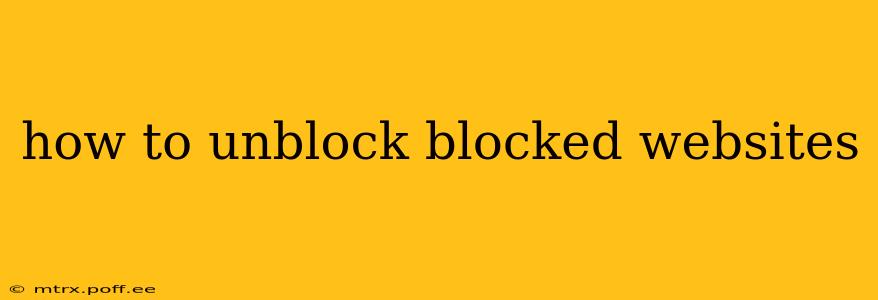Accessing blocked websites can be frustrating, whether it's due to restrictions at work, school, or your internet service provider. This guide explores various methods to bypass these blocks, ranging from simple tweaks to more advanced techniques. Important Note: While these methods can be helpful, accessing blocked content might violate your organization's policies or local laws. Proceed with caution and at your own risk.
Why are Websites Blocked?
Understanding why a website is blocked is the first step. Common reasons include:
- Workplace or School Policies: Many organizations block websites considered unproductive, inappropriate, or potentially harmful to their network security.
- Government Censorship: In some countries, governments actively block access to websites containing political dissent, social commentary, or other content deemed undesirable.
- Copyright Infringement: Websites offering illegal access to copyrighted material (movies, music, software) are frequently blocked.
- Malware or Phishing: Websites known to harbor malware or engage in phishing scams are often blocked to protect users.
- ISP Restrictions: Your Internet Service Provider (ISP) might block certain websites due to legal obligations or their own policies.
How to Unblock Blocked Websites: Methods & Considerations
Here are several methods you can try, with explanations and caveats:
1. Using a VPN (Virtual Private Network)
A VPN is arguably the most effective method. A VPN masks your IP address, making it appear as though you're browsing from a different location. This can bypass geographic restrictions and many workplace/school blocks.
- How it Works: A VPN encrypts your internet traffic and routes it through a secure server in a different location. Your actual IP address is hidden, making it difficult for websites or networks to identify your real location or block you.
- Pros: High effectiveness, good privacy, bypasses geographic restrictions.
- Cons: Can slow down your internet speed, requires a paid subscription for reliable services, some VPNs might log your activity (choose a reputable provider with a strong no-logs policy).
2. Using a Proxy Server
A proxy server acts as an intermediary between your computer and the internet. It receives your request, forwards it to the website, and sends the response back to you. This can mask your IP address, similar to a VPN, but often with less security.
- How it Works: Your browser settings are configured to use the proxy server's address. All your traffic goes through the proxy, hiding your IP address.
- Pros: Can bypass some blocks, relatively simple to set up (for some free proxies).
- Cons: Security risks (especially with free proxies), can be slower than a VPN, might not always be reliable.
3. Using a Tor Browser
Tor (The Onion Router) is a free and open-source browser known for its anonymity features. It routes your traffic through multiple servers, making it very difficult to trace your online activity.
- How it Works: Tor uses a layered encryption system to protect your privacy and bypass censorship.
- Pros: Excellent for anonymity and bypassing censorship in heavily restricted environments.
- Cons: Significantly slower than regular browsing, might not work with all websites, can raise security concerns in certain contexts.
4. Using a Different DNS Server
Your Domain Name System (DNS) server translates website names (like google.com) into IP addresses. Using a different DNS server (like Google Public DNS or Cloudflare DNS) might allow you to access websites blocked by your current DNS.
- How it Works: You change your network settings to use a different DNS server.
- Pros: Simple to implement, might resolve some simple blocks.
- Cons: Not effective against sophisticated blocking techniques, might not offer any privacy benefits.
5. Checking for Website Alternatives
Sometimes, a blocked website might have a mirror site or alternative address. Searching for alternative names or domain extensions (.org, .net instead of .com) might lead you to an unblocked version.
Frequently Asked Questions (FAQs)
Q: Is using a VPN legal?
A: Using a VPN is generally legal in most countries. However, using it to bypass restrictions imposed by your employer, school, or government might be a violation of their policies or local laws.
Q: Are free VPNs safe?
A: Many free VPNs are not safe and might log your activity, sell your data, or even inject malware into your system. It's strongly recommended to use reputable paid VPN services if you choose to use a VPN.
Q: Can I get in trouble for unblocking websites?
A: The legal consequences of unblocking websites depend on the specific context and the reason for the block. Violating your employer's or school's policies could lead to disciplinary action. Bypassing government censorship could have more serious legal repercussions.
Q: What is the most reliable way to unblock websites?
A: A reputable paid VPN service is generally the most reliable and secure method for unblocking websites.
By understanding the various methods and their limitations, you can choose the best approach for your specific needs. Remember to prioritize your security and always respect the rules and regulations of the networks you are using.
